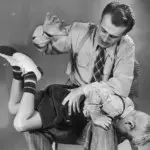 ‘Smacking’ or ‘spanking’ is the act of disciplining a child with physical pain. Until recently, this kind of punishment was commonplace. In Christian countries during the Middle Ages, the prevailing view was that all humans were born with ‘original sin’, inherited from Adam and Eve. Children were particularly sinful and one of the main functions of child-rearing and education was to extract or remove sinfulness from their character and their soul. This was to be done by firm parenting, an education in the Christian Scriptures and strict punishments for dishonesty and misbehaviour. Corporal punishment was one method available to parents to bring their children into line. ‘Spare the rod and spoil the child’ became a common saying.
‘Smacking’ or ‘spanking’ is the act of disciplining a child with physical pain. Until recently, this kind of punishment was commonplace. In Christian countries during the Middle Ages, the prevailing view was that all humans were born with ‘original sin’, inherited from Adam and Eve. Children were particularly sinful and one of the main functions of child-rearing and education was to extract or remove sinfulness from their character and their soul. This was to be done by firm parenting, an education in the Christian Scriptures and strict punishments for dishonesty and misbehaviour. Corporal punishment was one method available to parents to bring their children into line. ‘Spare the rod and spoil the child’ became a common saying.
For centuries the law backed the right of parents to utilise corporal punishment of their children, when and how they saw fit. In most cases it took the form of ‘smacking’ or ‘spanking’, either with an open hand or some kind of implement, such as a belt, a paddle, a wooden spoon or a birch stick. School teachers, were were deemed to be acting in loco parentis (in place of parents), were also delegated authority to use corporal punishment on miscreant students. Receiving ‘the strap’, ‘the switch’, ‘the cuts’ or ‘six of the best’ for bad behaviour at school was a common event for many students in Australian schools, as recently as the 1990s.
In recent times, the corporal punishment of children has come under scrutiny in many countries, particularly in Western liberal democracies. The decline of religious ideas, new research into child development and psychology and more relaxed attitudes to parenting have changed our views about children and their upbringing. ‘Smacking’ children is now much less prevalent than it was a generation ago. Since the 1960s the legality of ‘smacking’ has been consistently called into question. The Declaration of the Rights of the Child, a global agreement containing ten principles, was adopted by the United Nations in 1959. Amongst its content were assertions that children have the right to “special protection” and the opportunity to develop “in a healthy and normal manner and in conditions of freedom and dignity”.
Sweden was the first nation to remove parental ‘smacking’ rights in 1966. Since then, a further 23 nations have outlawed the corporal punishment of children, including Austria, Denmark, Finland, Germany, Greece, Hungary, Israel, the Netherlands, Norway, Portugal, Romania, Spain and the Ukraine. New Zealand passed an ‘anti-smacking’ bill in 2007 but then submitted the issue for public referendum, to be concluded in August 2009. ‘Smacking’ is still permitted by law in the vast majority of Asian, African and Middle Eastern countries. It remains legal in Great Britain, however parents are not permitted to use force that leaves marks, such as a bruise or welts, on the body. Critics of this change to British laws suggest that it is too hazy.
In the United States, spanking children also remains a parental right in all states. A few states have raised bills prohibiting spanking but they were soundly defeated. ‘Smacking’ also remains legal in Australia, though the issue frequently comes under review. In most parts of the country, corporal punishment is still considered an appropriate and effective means of parental discipline. In surveys in Victoria (2002) and Queensland (2007) more than 70 percent of parents supported ‘smacking’ a naughty child. It remains legal in all States and Territories for a parent to use “reasonable force” to punish their child. In 2007 Federal health minister, Tony Abbott, suggested a return to corporal punishment in schools, in response to an upsurge in school violence and bullying.
© lawgovpol.com 2014. Content on this page may not be republished or distributed without permission. For more information please refer to our Terms of Use.
